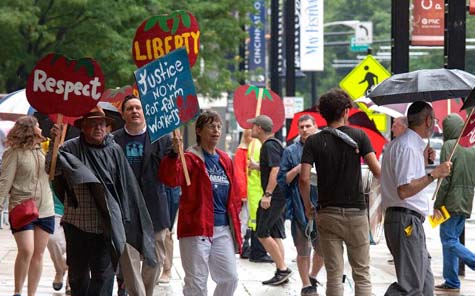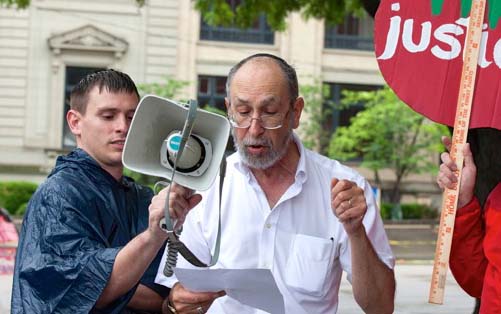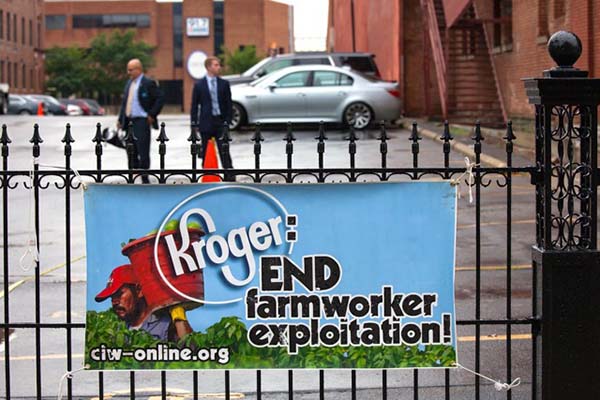[hupso title=”.@Kroger executives reject @FairFoodProgram (again) at Annual Shareholder Meeting” url=”https://ciw-online.org/blog/2015/06/kroger-shareholder/”]
Kroger CEO: “We expect all our suppliers… to follow our strict code of conduct…”
Farmworkers and their consumer allies have attended countless shareholder meetings over the years, from the very first shareholder actions back in the Taco Bell Boycott days, to the Wendy’s annual meeting earlier this month in Dublin, Ohio. But no company has received more visits to its shareholder meetings from the Fair Food Nation than Kroger, the nation’s second biggest grocery chain behind only Walmart. Counting last week’s action in Cincinnati, Ohio, Fair Food activists have attended six straight Kroger annual meetings, during which time the company has remained stubbornly resistant to joining the leading social accountability program in US agriculture today.
With every year that passes, the arguments for Kroger’s participation presented by farmworkers and a growing contingent of allies become increasingly stronger — the Fair Food Program’s documented success, its current expansion into new states and new crops, and the mounting list of Kroger’s competitors now participating in the Program all contribute to the ever more compelling case for Kroger’s participation. Meanwhile, Kroger’s arguments against joining the FFP grow ever more stale and obsolete.
However, as Kroger executives have found, nothing dampens the spirits of Fair Food supporters. Although less than a month has passed since the Wendy’s Shareholder action in the same state, the good people of Ohio — one of the strongest nodes of the vast and growing Fair Food network — were ready to pick up their protest signs once again and head out to Kroger’s Annual General Meeting, even in the face of some nasty weather.

Calls for Kroger to join the Fair Food Program began even before the meeting day arrived. The Cincinnati Enquirer, the city’s leading newspaper, published a powerful op-ed by retired rabbi and member of T’ruah, George Barnard, ahead of the shareholder gathering:

I love tomatoes. There is nothing like their sweet and tangy taste, and firm, moist consistency, but, these days, shopping for tomatoes has become a real pain. I like to shop at Kroger, because it is important to me to support the workers of a unionized grocery store. However, when it comes to tomatoes, I face a real dilemma. I want to buy tomatoes where the workers who pick them have been treated with dignity, whose human rights have been respected. I can buy those tomatoes at Trader Joe’s or Whole Foods or even Walmart – but not at Kroger.
Why not? Because for over five years, Kroger has refused to join a groundbreaking collaboration ensuring human rights for Florida’s farm workers, who pick the fresh tomatoes that most of us eat all winter. Conditions in Florida’s tomato fields used to be horrible. Workers faced wage theft, violence, sexual harassment and assault, and in the most extreme cases, modern-day slavery.
But change is here. In the past four years, a transformation has taken place, leading The New York Times to report in 2014 that Florida’s tomato fields had “gone from being the worst to the best” workplace in America agriculture. How did this happen? Through the leadership of the people to whom human rights and better wages in the fields matter most: Florida’s more than 30,000 farm workers. Their remarkable organization, the Coalition of Immokalee Workers, has forged the Fair Food Program, a historic partnership among farm workers, Florida tomato growers and 13 multibillion-dollar corporations.
These retailers require more humane labor standards from their Florida tomato suppliers, such as protections against physical and sexual abuse in the field, and commit legally to purchasing exclusively from farms that meet these higher standards. They also pay a penny-per-pound premium, which is passed down through the supply chain and paid out to workers by their employers. Compliance is strictly monitored and audited at every level of the industry.
Four of the 13 corporations that have joined the FFP are grocery stores. This includes industry giant Walmart, whose participation has led this summer to the expansion of these hard-won rights and wage premiums to tomato workers in other states. That means that never-before-seen protections applying to tens of thousands of farm workers could apply to hundreds of thousands. Kroger’s refusal to join, however, means that workers in their supply chain cannot be guaranteed the right to shade, or water, or to report abuse without fear of retaliation.
I wish I knew why Kroger hasn’t jumped at the chance to take part in a proven, worker-led solution to human rights abuses and poverty in its supply chain. In many ways, Kroger is an admirable corporate citizen, a good neighbor, a benefit to the community. But when it comes to farm workers in its supply chain, it continues to turn a blind eye. At its stockholders meeting last year, Kroger refused entry to farm workers and their representatives, despite the fact that they held valid proxies for the meeting, refusing to even listen to the CIW.
But this year can be different. On Thursday, I plan to join with Fair Food supporters from across Ohio as we march outside the Kroger shareholder meeting alongside the members of the CIW. Over 2000 years ago, the Jewish sage Hillel said, “If I am not for myself, who will be for me? If I am for myself alone, what am I? And, if not now, when?” It is time for Kroger to join the Fair Food Program. If not now, when?
True to his word, Rabbi Barnard joined Fair Food supporters last Thursday as they distributed flyers to the arriving shareholders, part of a broad and diverse contingent of local allies, spearheaded by the Cincinnati Interfaith Worker Center and including representatives from Ohio Fair Food, the Central Ohio Workers Center, Iron Workers, SEIU, First UU of Columbus, First UU of Cincinnati and St. John’s UU. Before seeing off Julia de la Cruz of the CIW into meeting, Rabbi Barnard shared a bilingual prayer (below), written beautifully for this precise moment and inclusive of all people of conscience.

The Ohioans kept going strong with chants for Fair Food for another hour before finally escaping the growing downpour and heading over to the Cincinnati Interfaith Workers Center office to await the report from the CIW.
Last year, the CIW delegation was shut out of the Kroger shareholder meeting, sparking a 100-person march through downtown Cincinnati to Kroger Headquarters — a not-too-distant memory that hung over the action this year like a dark cloud. However, while there was a Kroger official waiting at the door to check paperwork for the CIW and Alliance for Fair Food representatives, the company was not going to deny entry a second time.
An hour into the meeting, Julia de la Cruz took the mic to speak directly to Kroger’s CEO before 200 shareholders:
CIW: Good morning, my name is Julia de la Cruz. I’m here today representing the Coalition of Immokalee Workers, an organization of farmworkers internationally recognized for our work to end a long history of abuse in the fields. Just this year, the White House awarded us with the Presidential Medal for Extraordinary Efforts in Combating Modern Slavery.
It’s the sixth year that we’ve come here to this meeting to call on Kroger to join the Fair Food Program and uphold the highest ethical standards in your US tomato supply chain. Thirteen corporations are participating, including the world’s largest retailer, Walmart, in what was called “the best workplace monitoring program… in the US” on the front page of the New York Times.
But Kroger’s commitment is necessary in order to ensure that workers at the base of your supply chain aren’t excluded from these protections. Meanwhile, participating in the program will enable Kroger’s to mitigate risk and to give your consumers a product that you can stand behind.
Mr. McMullen, why refuse to give the opportunity to your shareholders to rest assured that Kroger is participating in this program, ensuring the elimination of farmworker abuses in Kroger’s supply chain?
Despite Julia’s powerful delivery of these comments, rooted in an even more powerful reality of abuse, struggle, and unprecedented change, the CEO’s answer was more of the same — corporate social responsibility straight out of the last century:
CEO Rodney McMullen: Thank you and obviously you understand that our relationships with our suppliers are very important, and every year we continue to invest money with our suppliers in terms of audits, and making those audits unannounced, as well as announced. And we expect all our suppliers, as I mentioned before, to follow our strict code of conduct. And whenever we find a supplier that doesn’t follow those strict codes, we stop doing business with them.
And we applaud the efforts of the folks — the suppliers in the Immokalee region — for the improvements they have made and we really do believe some of those improvements is [sic] due to your organization. But we really do believe our responsibility is to our customers and shareholders to negotiate directly with suppliers rather than going through a third party. So, appreciate the feedback and comments.
After a twenty minute wait, while every other general question was answered, Kroger executives reluctantly entertained a follow-up question from the Fair Food delegation:
Alliance for Fair Food: Good morning, my name is Elena Stein and I am here on behalf of the Alliance for Fair Food.
Mr. McMullen, you just justified Kroger’s refusal to join the Fair Food Program by insisting that Kroger’s monitors its own supply chain with its own code of conduct and that it has — at some unidentified point in the past — audited in Florida’s fields. When? Where? How frequently? With what standards, what auditors, and what consequences for non-compliance?
If Kroger was capable of having the resources to audit one of its many supply chains on its own, surely it would have been aware that nine cases of federally prosecuted slavery, involving over a thousand people, occurred in Florida agriculture before the Fair Food Program went into place. Surely it would have been aware of sexual violence in the fields, reported in one study as affecting as many as 80% of women in fields outside the Program’s protections. And yet, in all those years, did Kroger ever shift their purchases away from those farms? Or did you continue to purchase, turning a blind eye to this egregious abuse of the people who make possible the produce — referenced earlier as Kroger’s prized product — sold in your stores?
We aren’t asking you to design your own solution. The Coalition of Immokalee Workers has already done it. If Kroger were serious in any way whatsoever about eliminating abuses in its supply chain, it would take the simple step of joining the Fair Food Program, an established, proven solution to decades of abuses that are finally on their way to eradication from the fields. It asks remarkably little of participating buyers; quite on the contrary, it helps corporations like Kroger mitigate potential risk by ensuring that competent auditors are doing the job that a corporation of Kroger’s size simply does not have the resources to do well. Walmart joined voluntarily because they knew it was smart for business.
Mr. McMullen, it’s a simple choice: Do you want to continue to hold responsibility for the abuses that exist in your supply chain, growing the discontent from your consumers around the country as they call into question your corporation’s integrity — as with the protest outside today — or do you want to give your shareholders the assurance that you have joined an existing program designed to ensure the highest human rights standards?
To that, Mr. McMullen nearly repeated his first response, and in answer to the request for more detail on their monitoring process, weakly added, “We audit our suppliers once a year.”
These exchanges from inside the meeting could not have done a better job of illustrating the landscape of social responsibility today. On the one hand, there is the widespread and now widely-discredited practice of Corporate Social Responsibility, a model championed here by Kroger CEO Rodney McMullen that relies on corporate codes of conduct to define workers’ rights and corporate-controlled audits to monitor them. This audit-based model — at very best — places all of its weight on a one-time snapshot of conditions at a given moment that couldn’t possibly capture the ebb and flow of hidden, shifting, daily abuses and humiliations that are so typical of farm labor relations in agriculture.
On the other hand there is Worker-driven Social Responsibility, a model in which workers are the frontline monitors of a set of human rights standards of their own design through a 24-hour hotline and complaint resolution mechanism, reinforced by rigorous audits carried out by an independent third-party organization and backed by market-based, and therefore meaningful, enforcement. In other words, a seamless, continuous video as opposed to a one-time snapshot.
When all is said and done, it simply makes no sense for any company — much less one of the country’s largest supermarkets — that claims to be genuinely interested in protecting the human rights of tens of thousands of workers in its vast supply chain to intentionally opt for less information over more, a piece of paper over a living Code of Conduct, an illusion of voluntary compliance over concrete, verifiable enforcement. In other words, to choose the proven failure of CSR over the proven success of WSR.
No sense at all, of course, unless perhaps the company’s commitment to social responsibility is driven more by its own public relations interests than by a genuine concern for the human rights of workers.

